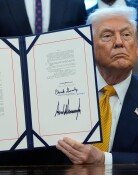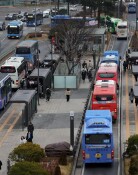Better politicians for true reform
Better politicians for true reform
Posted February. 16, 2011 11:11,
Both the ruling Grand National Party and the main opposition Democratic Party are revving up for reform of the nomination process for election candidates. The ruling partys committee on nomination reform gathered opinions in a discussion with first- and second-time lawmakers Monday. The committee is considering a process in which candidate selection is divided into 20 percent by party representatives, 30 percent by rank-and-file members, 30 percent by the people, and 20 percent by opinion polls. The Democratic Partys committee is considering an option to exclude opinion polls and let the people select its presidential nominee, and for the people and rank-and-file party members to elect nominees for lawmakers.
Both parties, however, are discussing only how to change the process and ignoring fielding new politicians who can meet the expectations of the public and the changes of the times. Merely changing the method will not complete reform. The different stakes of the people are funneled through political parties. Article 2 of the Political Party Act stipulates that for the purpose of this act, a party means a national voluntary organization aiming to take part in the formation of the nations political intention for national interests by recommending or supporting candidates for public positions. Only when parties properly carry out this function can they be called parties for the people.
Reform should start with the breaking away from vested interests of party factions. Though both parties urged nomination reform and formed a nomination screening committee by recruiting people from outside the party to run in the 2008 general elections, different factions within the parties did horse trading among themselves. Many in the ruling party discussing nomination reform consider it a challenge to touch the vested interests of incumbent lawmakers in the run-up to the nomination of presidential candidates. If the ruling partys pro-Lee Myung-bak and pro-Park Geun-hye factions evenly take up the nomination for the general elections next year, it will be no different from the outdated factional politics of the three Kims who used to dominate Korean politics -- Kim Young-sam, Kim Dae-jung and Kim Jong-pil.
Politicians should consider upgrading the political environment beyond changing the nomination method. They will find a solution if they consider why qualified people in every field of society and not political migrants are reluctant to enter politics. Only by improving the quality of politicians in a way that eliminates the prejudice that politicians are like flies in amber can politics bring in new blood. To do so, reform that can transform the nomination process and break the coalition of vested interests of incumbent politicians is required.
People also tend to vote for candidates based on regional alliances because parties do not recommend new figures and people grow disinterested in politics. Nomination reform will be the first step to bring the function of parties and politicians back to normal.







